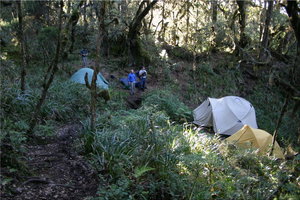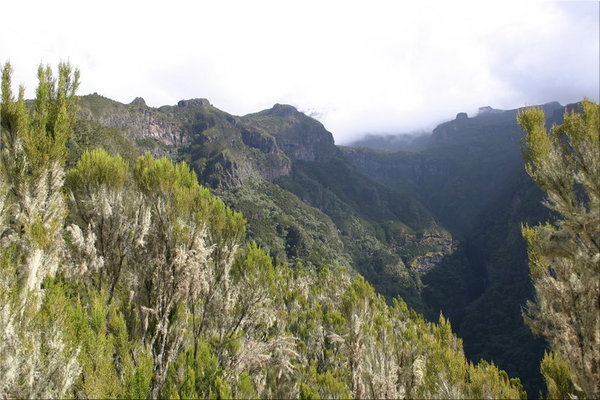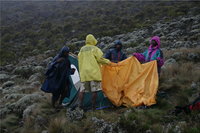

|
|
Umbwe Cave Campsite. Level tent sites are in short supply here.
|
The standard pattern is that we pack up our daypacks and our porter bags (i.e. our sleeping bag and air mattress) and leave the tent standing and just start our hike with Chombo. The crew will collapse our tents, and pack up the whole camp, and then pass us on the way up, to prepare camp again before we arrive.
Breakfast and dinner are served in multiple courses with a clean tablecloth and a candle (if it is dark). Breakfast typically consists of porridge, fruit, hot dogs, fried eggs, and toast. Dinner typically consists of a soup first course, often with chapati (thin pancakes, exactly like the Flädle made in southern Germany), then a carbohydrate main course (rice, potatoes or spaghetti) with a meat or vegetable stew, coleslaw and perhaps a piece of chicken each. Dessert is invariably fruit. For drinkables, hot water along with milk powder, cocoa powder, instant coffee and tea bags is supplied. Sometimes we get a trail lunch with typically a boiled egg, a piece of chicken, a buttered roll, a small bag of peanuts, a piece of cake or two cookies, a banana (the local variety which is about 5 inches long) and an orange (the local variety which has a dark green outer skin). Sometimes when we are in camp, we get an afternoon snack, which is popcorn and digestive biscuits. We carry our own supplemental "comfort foods" such as granola bars, chocolate and candy.

|
|
Barranco Gorge from the trail
|
In the morning, we are brought bowls of warm water for washing. For drinking water, we leave our empty bottles with them in the evening, and they are brought to us in the morning filled with boiled (but now cool) water. We have brought our own flavourings such as Tang and Gatorade.
The porters have generally poor footwear and clothing, and they carry their heavy loads mostly on their heads. Chombo has a proper backpack and carries all his own stuff; even so, I notice he does not use the waist belt that would transfer most of the load to the hip bones, as we ourselves prefer. In general, whenever a guide or porter has a good piece of gear, it has been donated by a generous client in the past.

|
|
Porters setting up one of our tents in the rain
|
After a hard and seemingly endless climb, we finally reach the Barranco Hut campsite at 13,000 feet elevation and in the fog and drizzle our tents are quickly set up for us. I soon discover what a mistake it was not to bring my paperback books, or one of those $2 earbud radios from the dollar store back home: The afternoons and evenings, cowering inside your tent out of the rain, are BORING.